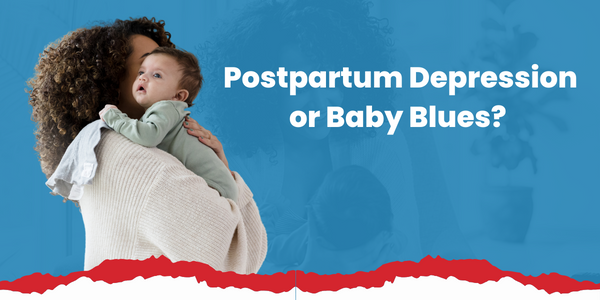
For many women, having a baby is an exciting time. Whether it’s your first baby or sixth, it can be a significant adjustment period. Many women experience periods of sadness or feeling overwhelmed known as the “baby blues.” These feelings can last weeks after birth. But some women experience more severe symptoms.
What is Postpartum Depression?
Postpartum depression (PPD) differs from baby blues in that the symptoms are much stronger and last much longer. Sometimes postpartum depression can even hit when the baby is months old. Baby blues are short-lived bursts of heightened emotion while PPD lingers and affects the mother’s ability to care for herself and the baby.
How Common is Postpartum Depression?
About 70% of women experience baby blues, but according to the CDC, 1 in 8 women suffer symptoms of postpartum depression. The causes of postpartum depression are mainly hormonal, with some increased risk factors including:
- very young or later maternal age
- baby born with special needs
- maternal history of depression or anxiety
- lack of support
What are the symptoms?
Symptoms of postpartum depression vary from person to person, but a new mother suffering from PPD will often experience the following:
- crying much more than usual
- lack of interest in activities usually enjoyed
- increase in or loss of appetite
- lack of interest in the baby
- anxiety or panic attacks
- trouble sleeping or sleeping too much
- difficulty thinking, concentrating or making decisions
- lack of interest in the baby
- feeling empty or hopeless
- thoughts of hurting the baby
- suicidal thoughts
What Can You Do if You or Someone You Know is Suffering from PPD?
If you or someone you know could be suffering from postpartum depression, don’t wait – get help. Make an appointment with your healthcare provider as soon as possible to discuss treatment options. Many resources exist to help women with these symptoms, and full recovery is very achievable.
How is Postpartum Depression Treated?
Treatment for postpartum depression is tailored to the patient and can include counseling and medications. The most important thing for a mother suffering from PPD is to know she is not alone and to tap into a support system whether that be family, friends, healthcare providers, or the many resources below.
- Postpartum Support International
- Postpartum Health Alliance
- National Suicide Prevention Lifeline
- National Alliance on Mental Illness
- Crisis hotlines and resources
If you are currently having thoughts of hurting yourself or your baby, please seek medical attention immediately or call 911.
